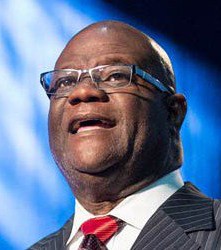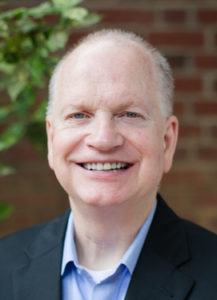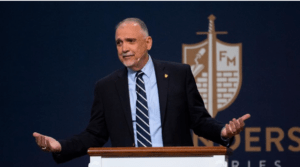Imagine you’re on a television game show vying for a $50,000 grand prize. All you have to do to win the money is give a proper definition of one term: Critical Race Theory. Could you do it?
If your answer is “no,” you’re not alone. It’s likely the vast majority of American adults could not give a simple definition — or any definition at all — for this relatively new term that has become a flashpoint of controversy in our national conversation about race and racism.
Yet despite this common lack of knowledge, the term “Critical Race Theory,” or “CRT” for short, has become a favorite descriptor for what some religious and political conservatives see as cultural sensitivity run amok.
Earlier this year, Donald Trump famously banned Critical Race Theory from being used to teach about diversity awareness in government agencies and by government contractors. In the first presidential debate this fall, he explained that his action was necessary because training employees about inherent biases in the workplace is itself “racist” and “un-American” and part of a “radical revolution” fueled by “very sick ideas.”
Then on Nov. 30, the presidents of the six Southern Baptist Convention seminaries jumped into the fray, using the occasion of celebrating the 20th anniversary of the SBC’s revised doctrinal statement to denounce Critical Race Theory as “incompatible” with the Baptist Faith & Message (2000 edition).
That declaration set off a firestorm of protest — especially from Black pastors and congregants, some of whom are threatening to drop affiliation with the SBC over it.

Dwight McKissic
“The seminary presidents’ position has put (African American) pastors on the defense. We constantly have to answer the question: Why do you remain in the SBC?” Black Texas pastor Dwight McKissic tweeted Dec. 26. “I’m yet to hear reasons for opposing CRT by the presidents that are clear, convincing and necessary. They succumbed to SBC racial culture.”
What is CRT?
Critical Race Theory is an academic concept that seeks to identify the roots of racism that have influenced society and continue to bear fruit today. It’s not a religion or a doctrine but rather is a construct for evaluating ourselves and our society. Thus, it has been used as a tool to help uncover forms of systemic racism that often are overlooked by the majority population.
For a more formal lay reader definition, turn to Wikipedia, which describes CRT as “a theoretical framework in the social sciences that examines society and culture as they relate to categorizations of race, law and power in the United States of America.”
Some critics deny the reality of “systemic racism” in American society.
Critics often claim this construct assigns blanket guilt to white people and is intolerant in its repudiation of intolerance. Some critics deny the reality of “systemic racism” in American society.
This movement began in law schools in the 1980s and was an outgrowth of academic theory related to race, postmodernism, queer theory, gender studies, inequality and post-colonialism. “Critical theory” as a broad category sees social problems as influenced by societal structures and cultural assumptions more than by individual and psychological factors. Thus the use of the term “systemic racism” to indicate that racism has been baked into American culture from the beginning and is not just a matter of an individual or group having racist thoughts or taking racist actions.
CRT posits that white supremacy is a real thing that has allowed white Americans — whether consciously or not — to maintain power over time. It places particular application on the law.
For example, systemic racism asks why Black men are incarcerated at rates disproportionate to their percentage of the U.S. population or why profound economic and educational gaps persist between Black citizens and white citizens. In the current moment, it asks why Black and brown people are disproportionately dying from COVID-19 compared to white people.
CRT is now taught in a number of U.S. law schools and is represented in university curricula in the fields of education, political science, women’s studies, ethnic studies, communication, sociology, and American studies.
Critics accuse CRT of being the product of liberal intolerance for traditional ideas, for being rooted in postmodernism, moral relativism and Marxism.

Danny Akin
That last point about Marxism appears to be a driving factor for the SBC seminary presidents. Danny Akin, president of Southeastern Baptist Theological Seminary in North Carolina, told Religion News Service CRT is rooted in Marxism. RNS reported: “Since Marxist theories are atheistic, Akin said, Southern Baptists must reject its underlying framework for understanding the world.”
What about Marxism?
Critical Race Theory is only the latest in a long line of issues and ideas that have been dismissed by cultural conservatives as “Marxism.” Historically, some conservative traditionalists have drawn a line from Marxism to feminism, multiculturalism, civil rights, LGBTQ rights, Black Lives Matter and other progressive social issues. At its worst, these accusations carry an antisemitic tone, blaming a small group of Jewish academics as the source of such liberalism.

Jacob Woolf
Jacob Woolf, a Jewish student and political activist at Trinity College in Dublin, Ireland, published an article on Medium last year noting the use of “Marxism” as an all-purpose label for things modern conservatives disdain globally.
“There is a spectre haunting conservatism, the spectre of Marxism,” he wrote. “It permeates across the forums and blogospheres of conservatives and libertarians, endlessly invoked and casually tossed out in barbed allegations. … A newfound interest in Marxism seems has infected not just a gaggle of ordinary conservatives but many of their leading and most influential figureheads.”
Writing in the Guardian newspaper in 2015, columnist Jason Wilson concurred. Appealing to “cultural Marxism,” he wrote, “allows those smarting from a loss of privilege to be offered the shroud of victimhood, by pointing to a shadowy, omnipresent, quasi-foreign elite who are attempting to destroy all that is good in the world. It offers an explanation for the decline of families, small towns, patriarchal authority, and unchallenged white power: a vast, century-long left-wing conspiracy.”
“Cultural Marxism” even has its own entry on Wikipedia, where it is described as a “far-right antisemitic conspiracy theory.”
In the United States, a related charge is to label progressive political ideas as “socialism.”
In the United States, a related charge is to label progressive political ideas as “socialism.” That was on full display this summer at the Republican National Convention, where Trump campaign adviser Kimberly Guilfoyle warned, “Biden, Harris and their socialist comrades will fundamentally change this nation.”
Two years ago, the Heritage Foundation published an article by Lee Edwards warning of the danger of Millennials embracing socialism via Vermont Senator Bernie Sanders. “Socialism is no longer a parlor game for academics but a political alternative taken seriously by Millennials who are not put off by the radical … platform,” he wrote.
And this summer, Eleanor Krasne of the Heritage Foundation published a lengthy article on its site claiming a very simple definition of Critical Race Theory as “a theoretical framework, rooted in Marxism, that posits individuals as oppressed or oppressor based on their skin color.”
Is CRT rooted in Marxism?

Ed Stetzer
One of the most extensive treatments of this question was published this summer on the Christianity Today website, via “The Exchange,” a blog forum curated by Ed Stetzer, who holds the Billy Graham Distinguished Chair of Church, Mission and Evangelism at Wheaton College and serves as executive director of the Billy Graham Center at Wheaton.
Stetzer earned both a master’s degree and a doctorate at Southern Baptist Theological Seminary and previously worked there at the invitation of President Albert Mohler.
Stetzer noted that since his Twitter feed “is filled with people calling one another Marxists, I thought it might be good to hear from a scholar who knows a bit more about it.” That scholar is Kelly Hamren, assistant professor of English at Liberty University. Her doctoral dissertation focused on 20th-century Russian poetry, with an emphasis on Marxist-Leninist ideology in the Soviet Union.
At Stetzer’s invitation, Hamren wrote a first-person post titled “Social Justice, Critical Race Theory, Marxism, and Biblical Ethics.”
“In my field, Marxism is one of the most commonly studied and most influential perspectives, and Critical Race Theory is also a significant force and gaining momentum,” she wrote. “As a result, I’ve studied these theories extensively.”

Kelly Hamren
To be clear, she is no fan of Marxism: “My studies have convinced me that the sufferings and deaths of millions are not only correlated with but largely caused by the Marxist-Leninist agenda, and I am therefore deeply opposed to Marxism as a framework.”
Hamren sees Critical Race Theory as “deeply informed by Marxism” and therefore admits she “will not agree with all of its tenets.” However, she added, “Marx was not wrong about absolutely everything. Very few thinkers are (probably because they are all made in God’s image) wrong about everything.”
She identifies two statements from Marx’s teaching that she finds resonate with Christian ideals: (1) Power does exist, and people do sometimes use it to oppress others; and (2) Oppressed people do suffer, and their suffering is often unjust.
“Reading the Old Testament will make these truths abundantly clear,” she suggested. “Because I believe people are made in God’s image (Genesis 1); the God whom I worship warned his followers repeatedly not to oppress the poor, widows, foreigners, …; and Jesus reached out to those whom society despised … , I can argue with confidence that my faith is wholly consistent with working to mitigate oppression in the society in which I live. By doing so, I am not embracing an alternate gospel but merely living in a way consistent with the gospel I have embraced since I was a child.”
Even though some Christians have criticized an emphasis on “social justice” as only a tenant of liberalism, Hamren said that’s not necessarily so. “What some are referring to as ‘social justice’ these days — making sure our laws and institutions don’t make it easier for the powerful to oppress marginalized groups — often refers to good, old-fashioned biblical justice.”
She added: “If the term ‘social justice’ is sometimes co-opted by Marxists, rejecting the concept outright robs Christians of the chance to become part of the conversation regarding its definition and application. It is a fluid concept right now, and using the term in a way that validates biblical principles of justice can help shape the way in which the cultural conversation develops.”
Further, Hamren does not see an inherent conflict between conservative biblical theology and the problem of systemic racism.
“If people are born in sin and people build a society, that society will be structured in ways that reinforce whatever sins dominate the hearts of those who build it.”
“If people are born in sin and people build a society, that society will be structured in ways that reinforce whatever sins dominate the hearts of those who build it,” she reasoned. “Therefore, even if many people’s hearts change a few generations later, those structures might still perpetuate the problems associated with that society’s ‘original sins.’”
This is why, she added, “it is possible to recognize that many individual police officers might not be racist and still believe that changes in police departments need to take place to discourage injustice.”
To affirm such a possibility from a biblical understanding of original sin differs from Marxim, Hamren asserted.
“Marxism posits that socio-economic forces create the problem, not that they perpetuate the problem. A true Marxist does not believe that individuals have essential selves apart from the historical contexts in which they develop.”
Christians who believe that sins, such as racism, originate in the human heart should see the need for an even deeper solution than Marxism proposes, she added. “The fact that we will never be able to eradicate sin (this side of the resurrection) does not mean we should sit back and allow it free reign.”
What’s the conflict with the Baptist Faith & Message?
The six SBC seminary presidents have not offered a detailed critique of Critical Race Theory, only a general assertion that it is incompatible with the Baptist Faith & Message.
The six SBC seminary presidents have not offered a detailed critique of Critical Race Theory.
However, in June 2019, messengers to the SBC annual meeting adopted a resolution “On Critical Race Theory and Intersectionality” that stopped short of a blanket condemnation. It acknowledged: “Critical Race Theory and Intersectionality alone are insufficient to diagnose and redress the root causes of the social ills that they identify, which result from sin, yet these analytical tools can aid in evaluating a variety of human experiences.”
The resolution — known now as Resolution 9 — affirmed Scripture as “the first, last and sufficient authority with regard to how the church seeks to redress social ills” and rejected “any conduct, creeds and religious opinions which contradict Scripture.” It also declared that Critical Race Theory “should only be employed as analytical tools subordinate to Scripture — not as transcendent ideological frameworks.”
Thus critics of the presidents’ statement who live within the SBC have expressed perplexity that the seminary leaders have taken a stance more restrictive than the convention itself.
For some far-right groups within the SBC — a description that might appear perplexing to those outside the denomination — the 2019 resolution did not go far enough. And alarms have been sounded about Critical Race Theory infiltrating SBC schools and agencies.

Tom Ascol
Tom Ascol, leader of a group of SBC Calvinists known as Founders Ministries, is among those who critiqued the SBC resolution.
“Any Christian leader who understands (Critical Race Theory and Intersectionality) and refuses to reject them is not a trustworthy guide in the battle that is currently raging within the church and culture,” he wrote on the organization’s website. “Anyone who promotes any of these ideologies is either too naive to be a leader or has become complicit with the enemy against Christ. There is no neutral ground.”
A search of the Founders Ministries website produces 31 articles published there about Critical Race Theory.
Another group, the Conservative Baptist Network, has made opposition to Critical Race Theory one of five key objectives listed on the home page of its website.
It declares: “The Network strongly believes in a just society for all based on biblical truth, opposing racism and sexism in all forms, and therefore rejects worldly ideologies infiltrating the Southern Baptist Convention, including Critical Race Theory, Intersectionality, and other unbiblical agendas deceptively labeled as ‘Social Justice.’”
Three days after the seminary presidents announced their stand against Critical Race Theory, the Conservative Baptist Network applauded the move: “We look forward expectantly to the presidents’ cooperation with us in rescinding Resolution 9 and to their taking concrete actions toward the elimination of these unbiblical doctrines and others like them, such as Black Liberation Theology, from our SBC seminaries.”
The Network likewise had applauded Trump’s executive order banning racial bias training.
“Critical Race Theory … treats ‘whiteness’ as a moral blight.”
“Critical Race Theory is an insidious ideology with its roots in neo-Marxism,” the group said in a statement posted to its website. “It purports to expose and correct ‘unconscious racial bias’ and ‘white privilege,’ and in doing so, treats ‘whiteness’ as a moral blight. It identifies ‘oppressor’ racial groups and treats anyone as a member of that group as guilty by association, while members of victim groups are considered morally innocent by virtue of their skin color.”
It concluded: “The battle against Critical Race Theory is a proxy for the larger battle between those who would define America on the lie that the color of one’s skin is immutably linked to one’s worth, and those who know the truth: that America was founded on a fierce belief (in) dignity and the equality of all — and those beliefs have made America the greatest barrier to racism and tyranny that the world has ever known.”
Ironically, one of the principles of Critical Race Theory is that for too long white people have set the agenda and controlled the conversation about race, while persons of color have been silenced. All six seminary presidents are white males, as are the leaders of Founders Ministries. The Conservative Baptist Network lists a 56-member steering council that includes two Black males and five women, one of whom is Black.
Related articles:
Southwestern president says SBC seminary leaders have been ‘misunderstood’ and ‘misconstrued’
SBC seminary presidents are ‘complicit with evil,’ revered California pastor says
SBC seminary presidents are propagating fear to maintain control | Laura Levens
Is it time for Black Christians to give up on the SBC? | Corrie Shull
How I learned to name my oppression — and my privilege | Meredith Stone
Please listen to my friend Ralph West about racism and the SBC | Joel Gregory


